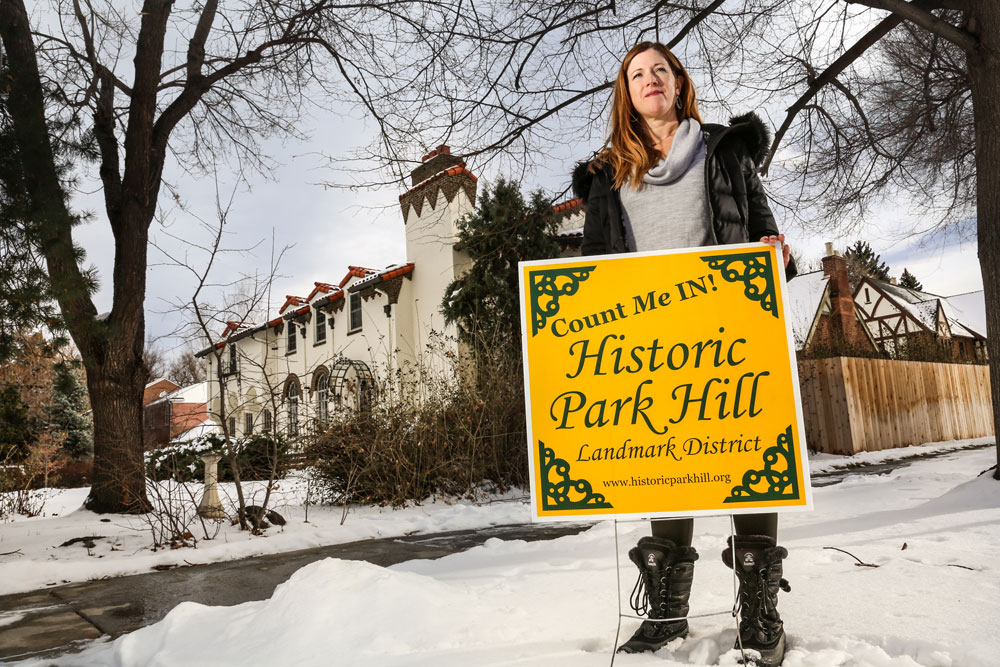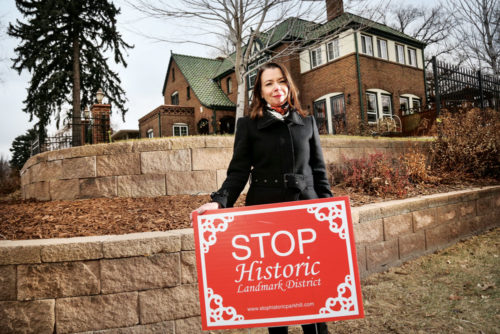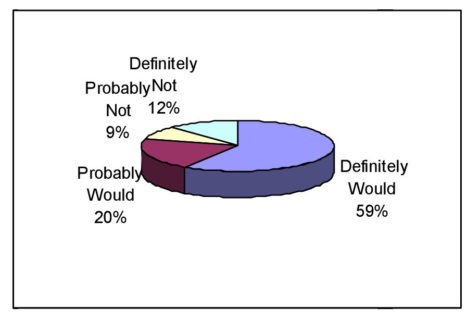
Rebecca Rogers, one of the founders of the Historic Park Hill Committee (HPHC), is pictured in front of her home.
Would historic designation thoughtfully protect and preserve the architecture and character of Park Hill? Or would it add a cumbersome review process that could deny homeowners the right to choose design alterations to enhance the space, energy efficiency and value of their property?
Rebecca Rogers, one of the founders of the Historic Park Hill Committee (HPHC), has lived in Park Hill since 2003. Remodels and construction that changed the appearance of original structures provided the impetus for a general outreach to neighbors to consider preservation options. “We found that many of our neighbors want to keep the architecture that makes Park Hill unique. Protecting the smaller bungalows also became a priority,” says Rogers. The concerned neighbors decided in 2016 to form the HPHC to pursue a historic designation with the city of Denver’s Landmark Preservation Commission. They are now renewing their outreach efforts to provide Park Hill residents with information about the issue.
Matt Bradford, who is in the construction industry, has lived in Park Hill for 23 years. He largely agrees with a historic designation based, in part, on the changes he’s seen in other neighborhoods like the Highlands and Washington Park. “While there have been some construction projects that have been done well, there are others that have not. Cheap construction or poorly planned projects take away from the soul of a neighborhood steeped in tradition. A historic designation would help prevent scraping and pop-tops that are done with profit as the primary motivation.”
The Denver City Council must vote to approve a historic district designation, which would require homeowners to submit plans for exterior structural and property changes to a Landmark Commission, appointed by the mayor of Denver, for review. This review is in addition to the normal permits required by the city of Denver. While there is no fee for the design review process, the commission determines if proposed changes will be done in a manner that complements the structure, the surrounding homes, and the neighborhood. Commission approval would be required before work could begin. Properties in historic districts generally have higher property values.

Leah Capritta stands in front of her wall that a semi truck crashed into. She opposes the Park Hill historic designation and thinks it may deem such a wall noncompliant
However well-intentioned, the HPHC is not without its detractors. Residents opposed to the designation believe it would add a cumbersome review process that could deny homeowners the right to choose design alterations to enhance the space, energy efficiency and value of their property. These residents created an opposition group called Stop Historic Park Hill. They cite permit processes, environmental impact, economic impact and insurance issues as some of the reasons to oppose the designation.
Real estate agent Judy Wolfe, a Park Hill resident since 1972, is opposed to the designation. She believes the neighborhood is a work-in-progress. “The restrictions a historic designation would impose are definitely food for thought,” says Wolfe. “We need to make sure that the rights of property owners are respected and they are able to modify their homes to meet their needs.”
A common landscape feature of many Park Hill homes is a grassy knoll nicknamed the “Denver Bump.” These mini-hills are difficult to mow and the upkeep can be tedious. Wolfe has built a multitiered retaining wall to make her property easier to maintain and increase her gardening space. She has also replaced her windows with a more energy-efficient option. “Those opposed to the historic designation are concerned that the property values of the smaller homes will be adversely affected if restrictions are imposed,” Wolfe says. “It may discourage buyers from purchasing a smaller bungalow if they anticipate they’ll need more living space in a few years.”
Leah Capritta and her husband, who oppose the historic designation, bought their Park Hill home 12 years ago. They love the area for its proximity to the Denver Zoo, the Denver Museum of Nature & Science, City Park, and the short commute downtown.

In October 2016, residents of registered historic neighborhoods in Denver were surveyed on whether, after living in such a neighborhood, they would support historic designation again. The chart shows responses from Montclair, Baker, Alamo Placita, Driving Park, Allen Ghost, East Seventh Avenue and Country Club neighborhoods.
A fixer-upper when it was purchased, Capritta says they have made changes to both the outside of their Tudor home and to their landscaping. One of the changes was to build a retaining wall in the front yard. “We wanted to create an easier area to mow and maintain attractively while shielding the yard from Colorado Blvd.” As it turns out, protecting their yard from street traffic was important. A couple of years ago, a semi truck ran off the road and crashed into a corner of their retaining wall. “If a historic designation had been in place at the time, the wall might have been deemed noncompliant, says Capritta.
The area being considered for historic designation is the original Park Hill subdivision, a 32-block area platted by Baron Allois Gullaume Eugene Von Winkler in 1887. It includes the east side of Colorado Blvd. to Dahlia and the north side of Montview Blvd. to 26th.
Ryan Hunter serves on the board for Greater Park Hill Community (GPHC). Representing the entire area in question, he says, “Currently, there is no real preponderance of support either way,” prompting the group to withhold a position on historic designation. “Regulations leave a lot of room for interpretation,” says Hunter. “The GPHC feels a responsibility to help facilitate the dialogue on both sides. In the meantime, we’ll see how the issue evolves.” Councilman Chris Herndon concurs. “I don’t have a position on the issue at this time,” says Herndon. “The application is something I would want to carefully review. Historic designation does affect individual property rights, and I don’t take that lightly. I will make a determination when an application is presented.”
“It’s a tough decision, and there are pros and cons to both sides,” says Rogers. “There is no real easy fix, but we feel strongly that people deserve to have correct information in order to make well-informed decisions.” Residents may contact the committee by visiting the HPHC website. Suggestions, questions and concerns can all be submitted online and will be addressed by the committee at their bi-monthly meetings.
For more information about Park Hill historic designation, visit www.historicparkhill.org and www.stophistoricparkhill.com. To view a PDF of the full survey, please click here: Historic survey data




0 Comments